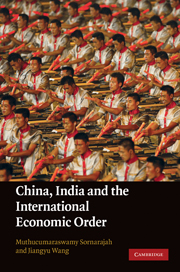Book contents
- Frontmatter
- Contents
- Notes on contributors
- Preface
- Introduction and overview
- PART I China, India and the global trade system
- 1 The WTO and development policy in China and India
- 2 China, India and developing countries in the WTO
- 3 China–India cooperation, South–South coalition and the new international economic order
- 4 India, China and foreign investment
- 5 China, India and WTO Law
- 6 China, India and the WTO dispute settlement system
- 7 China, India and dispute settlement in the WTO and RTAs
- 8 China, India and global outsourcing of services under GATS
- 9 International dispute settlement
- PART II China, India and regional economic integration in Asia
- PART III Law and development in China and India: Domestic issues
- Index
- References
9 - International dispute settlement
The Chinese approach and practice, and their implications
from PART I - China, India and the global trade system
Published online by Cambridge University Press: 03 May 2011
- Frontmatter
- Contents
- Notes on contributors
- Preface
- Introduction and overview
- PART I China, India and the global trade system
- 1 The WTO and development policy in China and India
- 2 China, India and developing countries in the WTO
- 3 China–India cooperation, South–South coalition and the new international economic order
- 4 India, China and foreign investment
- 5 China, India and WTO Law
- 6 China, India and the WTO dispute settlement system
- 7 China, India and dispute settlement in the WTO and RTAs
- 8 China, India and global outsourcing of services under GATS
- 9 International dispute settlement
- PART II China, India and regional economic integration in Asia
- PART III Law and development in China and India: Domestic issues
- Index
- References
Summary
International disputes are often blights to international relations between disputing nations. It is especially true if the disputes, which relate to the vital interests such as sovereignty of states and international peace and security, are not settled in a reasonable manner. The hanging disputes will not only impact on the relations of disputing parties, but also have a bearing on the interests of the region concerned or the whole world. Against this backdrop, it goes without saying how important the dispute settlement mechanism is vis-à-vis dispute settlement. This becomes more prominent when the bilateral relationship between the disputing parties is fragile and intense. Settlement of disputes plays an important role when both parties intend to maintain their relationship at a certain level. In other words, the function of the dispute settlement mechanism is simply to maintain the relationship between the disputing parties.
The past thirty years since China opened its doors to the outside world witnessed constant disputes between China and other countries (especially the United States), ranging from territorial disputes, to political disputes and to trade disputes. As the nation rises as an emerging economic giant, a resurgence of nationalism across the globe and muscle-flexing by China can be expected, and thus more disputes are likely to occur between the country and the rest of the world.
- Type
- Chapter
- Information
- China, India and the International Economic Order , pp. 314 - 330Publisher: Cambridge University PressPrint publication year: 2010

